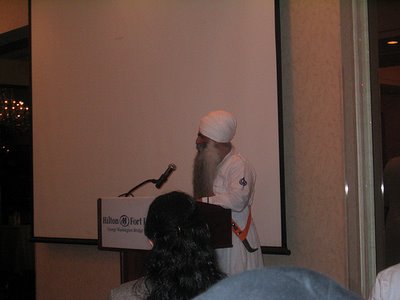Monday, June 26, 2006
Random Flickr Blogging #4580
And now, without further ado,


Be back later this week, I hope.
Labels: Random Flickr Blogging
Monday, June 19, 2006
Random Flickr Blogging #0382


Labels: Random Flickr Blogging
The War on Terror Jumps the Shark; or, God Help AMerica
The logic looks something like this. If your goal is not just to remove your enemy as a threat (the prime goal in normal war, surely) but to keep them under your thumb, subject to your whim, dejected and powerless, with no hope of escape or release and no reason to expect justice, for as long as you want and regardless of whether you have adequate evidence that they deserve this imprisonment, so that death is their only sure way out of their predicament, and you want all the while to maintain the fiction that you're doing this purely for self-defense and not out of any yearnings toward sadism—well, then your enemy's suicide is an act of war rather than a favor they've done you. It removes them as a threat in one way, to be sure, but if your goal in imprisoning them is not merely to remove them as a threat but to humiliate and oppress them, then suicide represents their only sure-fire way of frustrating your sadism. Any critical attention it brings to the whole operation is an added bonus for the prisoner—and a curse for the jailer. By this logic, lonely acts of self-destruction become acts of asymmetrical warfare and good PR moves. Of course, such a logic and such a "goal" are unworthy of embrace by a civilized nation, but alas, that doesn't seem to have stopped us.
I know what some people are thinking at this point: But the detainees are terrorists! They're bad men! Our leaders have said so! This may well be true of some of them—again, if so, shouldn't we see their suicides as acts of surrender rather than acts of war?—but let's review some of what we've found out about Guantanamo thanks to the National Journal. The NJ examined court documents on 132 detainees (approximately a fourth of the Guantanamo detainee population); out of these,
- the majority of the detainees were not Afghan
- the majority were not even picked up in Afghanistan (site of the U.S. battle with the Al Qaeda-sheltering Taliban) but in Pakistan
- the majority were not picked up by American troops (despite assertions to the contrary by Bush, Cheney, Rumsfeld, and their spokespersons)
- only 43% were actually accused of even being on a battlefield in post-9/11 Afghanistan
- only eight of the 132 were tied directly to plans for terrorist attacks outside of Afghanistan
Many of them are not accused of hostilities against the United States or its allies. Most, when captured, were innocent of any terrorist activity, were Taliban foot soldiers at worst, and were often far less than that. And some, perhaps many, are guilty only of being foreigners in Afghanistan or Pakistan at the wrong time. And much of the evidence -- even the classified evidence -- gathered by the Defense Department against these men is flimsy, second-, third-, fourth- or 12th-hand. It's based largely on admissions by the detainees themselves or on coerced, or worse, interrogations of their fellow inmates, some of whom have been proved to be liars.The NJ found, for example, that one prisoner had made accusations against more than 60 inmates—over 10% of the detainee population. When one suspicious and dutiful U.S. officer did some digging, however, he found that none of the men this prisoner had accused of being at a terrorist training camp in Afghanistan had even been in Afghanistan at the time the accuser said he saw them there. Then there's the case of Murat Kurnaz, who was snatched off a bus full of Islamic missionaries in Pakistan in October 2001 and condemned entirely on the basis of a brief, anonymous memo, even though other documents in his file—including testimonials from both U.S. and German intelligence services—denied that there was any evidence linking him to Al Qaeda. And let's not forget the use of sarcasm as evidence:
One man slammed his hands on the table during an especially long interrogation and yelled, "Fine, you got me; I'm a terrorist." The interrogators knew it was a sarcastic statement. But the government, sometime later, used it as evidence against him: "Detainee admitted he is a terrorist" reads his tribunal evidence. The interrogators were so outraged that they sought out the detainee's personal representative to explain it to him that [sic] the statement was not a confession.The NJ stories do not claim that all the detainees at Guantanamo are victims of monkey justice like this; indeed, the NJ acknowledges that there is good evidence that some of the men there really are serious terror threats. What about the three men who killed themselves last week? According to the Charlotte Observer (whose reporters broke the suicide story and whose reporters were also, surprise surprise, recently ejected from Gitmo, along with other journalists):A Yemeni, whom somebody fingered as a bin Laden bodyguard, finally said in exasperation during one long interrogation, "OK, I saw bin Laden five times: Three times on Al Jazeera and twice on Yemeni news." And now his "admission" appears in his enemy combatant's file: "Detainee admitted to knowing Osama bin Laden."
The U.S. Defense Department released the identities of three Guantanamo detainees who committed suicide.The "mid-to-high level al-Qaida operative" sounds fairly scary; ditto maybe the "member of a militant missionary/recruitment group, " though check out the case of Farouq Ali Ahmed for a less threatening possibility for what a "missionary" connection might mean. And "front line fighter for the Taliban" is not the same thing as "terrorist":Saudi Arabians Mani Shaman Turki al-Habardi Al-Utaybi and Yassar Talal Al-Zahrani -- identified earlier by Saudi officials -- and Ali Abdullah Ahmed, were the prisoners who hung themselves Ahmed's nationality was not provided, but U.S. military officials earlier said that two Saudis and one Yemeni had taken their lives:
- Ali Abdullah Ahmed of Yemen was identified by officials as a mid-to-high level al-Qaida operative who has been non-compliant and hostile to the guard force; was a long term hunger striker from late 2005 to this May.
- Mani Shaman Turki al-Habardi al-Utaybi of Saudi Arabia was a member of a militant missionary/recruitment group for al-Qaida and other jihadist terrorist groups and had been recommended for transfer to another country.
- Yassar Talal Al-Zahrani of Saudi Arabia was a front line fighter for the Taliban and traveled to Afghanistan to take up arms against anti-Taliban forces.
By the fall of 2002, it was common knowledge around CIA circles that fewer than 10 percent of Guantanamo's prisoners were high-value terrorist operatives, according to Michael Scheuer who headed the agency's bin Laden unit through 1999 and resigned in 2004. Most of the men were probably foot soldiers at best, he said, who were "going to know absolutely nothing about terrorism." Guantanamo prisoners might be pumped for information about how they learned to fight, which could help American soldiers facing trained Islamic insurgencies. But the Defense Department and FBI interrogators at Guantanamo were interested more in catastrophic terrorism than in combat practicalities. They kept asking "every one of these guys about 9/11 and when was the next attack," questions most of these low-level prisoners couldn't answer, Scheuer said.But this is beside the point. If these guys were really The Enemy, then they've done us a favor by destroying themselves; if we think their suicides were "an act of asymmetrical warfare" rather than an admission of defeat, it must be because we're interested in more than just neutralizing these people as threats. There's that logic again.
Back in the Sixties, Harlan Ellison wrote an (in)famous short story called "I Have No Mouth, and I Must Scream." It's about a quintet of people trapped in the bowels of a malevolent supercomputer called AM—which at first meant Allied Mastercomputer, then Adaptive Manipulator, then Aggressive Menace, and finally, in a grotesque echo of both Descartes and Yahweh, merely I AM. To the people trapped within him, AM might as well be God; he can do as he wills with them, and what he wills is hell. Almost omnipotent and thoroughly malevolent, AM reconstructs reality at whim, visiting hunger, thirst, violence, and madness upon his helpless captives, rearranging their very bodies and minds, driving them to the edge of death but never letting them die, always bringing them back for further torment, year upon year upon year. Like a lot of great science fiction, the story may not be literarily great (Ellison supposedly wrote it in a single night in 1966, and the first-draftiness shows through in places), but its highly condensed allegorical suckerpunches startle the mind in ways that the mind never quite forgets. And then there are passages like this:
AM went into my mind. He walked smoothly here and there, and looked with interest at all the pock marks he had created in one hundred and nine years. He looked at the cross-routed and reconnected synapses and all the tissue damage his gift of immortality had included. He smiled softly at the pit that dropped into the center of my brain and the faint, moth-soft murmurings of the things far down there that gibbered without meaning, without pause. AM said, very politely, in a pillar of stainless steel bearing bright neon lettering:The hero/narrator of "I Have No Mouth, and I Must Scream" is, ultimately, a kind of Jesus in reverse: seizing an opportune moment, he kills his fellows to free them from AM's otherwise inescapable torments. In a final perverse twist on the Christ story, however, the hero is condemned to eternal life in the clutches of AM, as AM stops him before he can kill himself and then alters him into a soft, helpless, jellylike creature that can only shamble about, accepting AM's torments and absorbing AM's hatred, denied even the sweet release of a scream by AM's reconstructive ministrations (hence the title). There's an image you don't soon forget, let me tell you.
AM said it with the sliding cold horror of a razor blade slicing my eyeball. AM said it with the bubbling thickness of my lungs filling with phlegm, drowning me from within. AM said it with the shriek of babies being ground beneath blue-hot rollers. AM said it with the taste of maggoty pork. AM touched me in every way I had ever been touched, and devised new ways, at his leisure, there inside my mind.
Until I heard suicide described as "an act of asymmetrical warfare," I'd have sworn that it was only a matter of historico-typographical accident that you can't spell America without AM. Until I heard human self-destruction referred to as "a good PR move," the connection between AM and AMerica had honestly never occurred to me. It took the Bush II Administration to take the connection from merely typographical to sadly analogical, to take AM from being a dark, perverted analogue of God to being a dark, perverted analogue of my country. The resemblance, thank God, nature, humanity, luck, or whatever, is still not close; until recently, however, I wouldn't have thought it was there at all. But an America governed by a logic which sees even suicide in terms of war and PR is an America already well along in the process of mutating into the United States of AM.
Thankfully, this is Juneteenth, so I can close by remembering better days, pre-mutation days, when America was stepping up into the light rather than down into the shadows. Maybe when we get rid of the current cabal and its lunatic logic we can start moving in the right direction again.
Tuesday, June 13, 2006
Stuart Klawans Brings the Funny
My spiritual adviser, Rabbi Simcha Feffeferman, is learning to use e-mail. Lucky me. Rebbe@AnsheTsurris.org writes:To that thought, all I can add is Grrrrrrrrrrr.Da Vinci Code director Ron Howard, known as Opie = O.P. Symbolologically, this means Opus Payee, ancient Hollywood brotherhood! They make fun of you for watching their movies, and still they get paid!
Writer Akiva Goldsman obviously descended from Rabbi Akiva of blessed memory, who derived volumes of law even from the squiggles on letters of holy Torah. Strange. Why didn't this Akiva derive so much as a piece herring from a "book" everybody reads?
Also a mystery: Audrey Tautou = tow to = 22, not high caliber! Why her for this movie? She's French, she's pretty. Eleanor Powell she's not, let alone the living vulva of Jesus Christ.
And Mr. Big Star Tom Hanks with his Harvard Professor hair—deeper mystery. Change "H" to "Y" and you got Tom Yanks! Does he? All he's pulling here is a straight face, and then not even.
You see the pattern? It all works by opposites! The secret code is, "Grail, shmail. Just give us the money." But what I say, like we did in yeshiva, is, "The truth is out there."
Gillian Anderson—some Magdalene she'd make!
Tropical Pasta
 To make Tropical Pasta, just go to Weather Underground's Tropical Weather page, look for storm advisories (don't worry—in a couple of months, you'll probably have several to choose from at once), and click on "Computer Models." Then, savor the twirly, twisty polychromatic delights cooked up by the various forecasting programs. Sometimes they agree; sometimes they disagree; always, they're pretty.
To make Tropical Pasta, just go to Weather Underground's Tropical Weather page, look for storm advisories (don't worry—in a couple of months, you'll probably have several to choose from at once), and click on "Computer Models." Then, savor the twirly, twisty polychromatic delights cooked up by the various forecasting programs. Sometimes they agree; sometimes they disagree; always, they're pretty.
They should be TV pundits. BAM could be the blustery Hannityesque host, GFS (AVN) his ineffectual, overly conciliatory liberal foil. ("Oh. A made-for-TV liberal.") NOGAPS could be the raving right-winger who legitimizes insanity; GFDL could be the respected newspaper columnist who keeps getting invited to pontificate on camera despite a track record of being wrong on damn near everything. UKMET could be the token voice of reason. We could replace CNN, Fox, MSNBC, etc. with The Weather Channel. We'd probably all be better off.
Monday, June 12, 2006
Random Flickr Blogging #9369




Labels: Random Flickr Blogging
Tuesday, June 06, 2006
That Vision Thing
West's op-ed is titled "The Troops Have Moved On." Where from? Where to? Why? you may be wondering, like the generations of impatient schoolchildren who have wondered What old man? What sea?. Let's see if we can reconstruct these mysterious peregrinations.
It never hurts to begin with a pithy quote from a revered historical figure, and West does not disappoint:
"Neither party expected for the war the magnitude or the duration which it has already attained. Neither anticipated that the cause of the conflict might cease with or even before the conflict itself should cease."Hmm. There are a lot of words in Lincoln's second inaugural address; why choose these, and why are they especially "relevant again now"? Pay attention to that "the cause of the conflict" bit. I think it might have something to do with where the troops have supposedly moved on from.So said Abraham Lincoln in his second inaugural address, describing a war that put 11 percent of our citizens in uniform and had by that point killed nearly one of out every seven soldiers. That his words are relevant again now is a troubling indicator of our national endurance.
We are at the outset of a long war, and not just in Iraq. Yet it is being led politically by the short-sighted, from both sides of the aisle. The deterioration of American support for the mission in Iraq is indicative not so much of our military conduct there, where real gains are coming slowly but steadily, but of chaotic leadership.West's bipartisan generosity ("the short-sighted" are on "both sides of the aisle") is most welcome—his organization, Vets for Freedom, also seems refreshingly free of the all-too-common Either you're pro-war or you're a terrorist/traitor false dichotomy that pollutes so many minds on the right—but I fear that what he giveth with one hand, he taketh away with the other. He wants us to be a fist, not just five fingers; he wants us to rally, not squabble. Squabble about what? Rally behind whom? What "slow fuse" is he talking about? What "long war," and against whom?Somehow Operation Iraqi Freedom, not a large war by America's historical standards, has blossomed into a crisis of expectations that threatens our ability to react to future threats with a fist instead of five fingers. Instead of rallying we are squabbling, even as the slow fuse burns.
One party is overly sanguine, unwilling to acknowledge its errors. The other is overly maudlin, unable to forgive the same. The Bush administration seeks to insulate the public from the reality of war, placing its burden on the few. The press has tried to fill that gap by exposing the raw brutality of the insurgency; but it has often done so without context, leaving a clear implication that we can never win.No, I'm not sure what two parties he's talking about, either. Let's see if the New Shorter Oxford English Dictionary on CD-ROM can help.
- sanguine -- having the temperament attributed to people of [ruddy] constitution; confident, optimistic. [Or might West mean the more poetic/rhetorical definition: "causing or delighting in bloodshed"?]
- maudlin -- characterized by tearful sentimentality; mawkishly emotional; weakly sentimental.
In the past, the American public could turn to its sons for martial perspective. Soldiers have historically been perhaps the country's truest reflection, a socio-economic cross-section borne from common ideals. The problem is, this war is not being fought by World War II's citizen-soldiers. Nor is it fought by Vietnam's draftees. Its wages are paid by a small cadre of volunteers that composes about one-tenth of 1 percent of the population—America's warrior class.Aha, this op-ed is really a defense of national service, I thought as I read this the first time. That would fit with Memorial Day, and maybe "The Troops Have Moved On" means "We need to replace them, and here's how to do it." Though I opposed the Iraq war, I have generally been sympathetic to the idea of required national service. Provided that service requirements are equitable (no exemptions for the wealthy, alternatives for conscientious objectors, etc.), it seems reasonable to me that a state might require a reasonable amount of service from its citizens just as it might require a reasonable amount of taxes from them. We needn't get into this now, though, as West isn't heading this way, after all.
The insular nature of this group—and a war that has spiraled into politicization—has left the Americans disconnected and confused. It's as if they have been invited into the owner's box to settle a first-quarter disagreement on the coach's play-calling. Not only are they unprepared to talk play selection, most have never even seen a football game.How exactly are Americans "disconnected and confused," and about what? The nebulousness returns. West has used the magic words as if, however; he's given us a metaphor. A metaphor is a comparison in which one thing (the tenor) is described in terms of another thing (the vehicle). Metaphors are very useful for building bridges between the familiar and the unfamiliar, the known and the unknown, the understood and the mysterious. Let's see if we can figure out where West's bridge leads.This confusion, in turn, affects our warriors, who are frustrated by the country's lack of cohesion and the depiction of their war. Iraq hasn't been easy on the military, either. But the strength of our warriors is their ability to adapt.
"It's as if they [Americans] have been invited into the owner's box to settle a first-quarter disagreement on the coach's play-calling." The vehicle is a football game which has just begun (it's only the first quarter); what is the tenor? What exactly is West comparing this football game to? The war in Iraq? The "war on terror"? The latter would fit with "first-quarter," I guess, and with the "long war" that we're only "at the outset of...and not just in Iraq" mentioned earlier. But then war on terror is itself a metaphor (like war on drugs and war on crime), as you can't wage literal war on an abstract concept. It's also, I might hasten to add, a very misleading metaphor, as it suggests that the kinds of actions appropriate for fighting entire nations (massive deployments of troops, militarization of the economy and the society, deficit spending, curtailments of civil liberties, etc.) are also appropriate for fighting scattered cells of malcontents hiding in ghettos and grottos across the globe. This is highly questionable. (Then again, if your primary interest isn't so much fighting terrorists as it is militarizing the country, emptying its coffers, and curtailing its freedoms, why, then it's a great metaphor.)
And who exactly is the coach? President Bush? Secretary of Defense Rumsfeld? The Joint Chiefs of Staff? The Project for a New American Century? And what does "invited into the owner's box" mean? Don't we own the team? Isn't it our damn box? Or is our place in the cheap seats, and our role to enjoy the spectacle and cheer on cue and otherwise mind our own business—and let the people in the owner's box mind the country's business? (How gracious of them to invite us rabble in for a moment.) I wonder how committed Major West is to this metaphor.
And what exactly is the "disagreement" about? The metaphor suggests that it must be about how the game should be played, but isn't the disagreement really about whether we should be playing this particular game at all? Those of us who opposed the Iraq war, for example, thought that this game was a really bad idea in the first place and that we should be playing a different game—and forgive me for saying that the course of events since April 2003 makes our side look pretty damn right. And most Americans would have wanted to play a different game, too, had it not been for those nonexistent weapons of mass destruction and that nonexistent connection to the 9/11 attacks.
But wait! We're not supposed to think about how we got led into this game anymore:
First, in battle you move forward from where you are, not where you want to be. No one was more surprised that Saddam Hussein had no weapons of mass destruction than the soldiers who rolled into Iraq in full chemical protective gear. But it is time for the rest of the country to do what the military was forced to: get over it.Aha! Is this what the troops have "moved on" from? The fact that the people who sent them into Iraq have been revealed to be, at best, tragically incompetent and, at worst, shamelessly mendacious? The fact that thousands of people are dead and billions of dollars are lost because of stupid decisions, insane convictions, and/or outright lies? The fact that, as a result of these things, our country is now mired in an expensive occupation that's swallowing up the very resources (troops and dollars) that would come in so handy in the fight against people who might actually threaten us? The fact that many of the architects of this debacle have not only not been fired, censured, or impeached but have instead been honored and promoted, while many loyal public servants who tried to stop this nightmare from beginning have been ridiculed, purged, and prodded to "move on" themselves? (Needless to say, not all of even Major West's military comrades have "moved on" from these unfortunate facts.)
If we can put 2003's debates behind us, there is a swath of common ground on which to focus. Both Republicans and Democrats agree we cannot lose Iraq. The general insurgency in Iraq imperils our national interest and the hardcore insurgents are our mortal enemies. Talking of troop reductions is to lose sight of the goal.Put those debates behind you, America. Pay no attention to the incompetence, the insanity, the lying. Move on. Oh, but keep shoveling your soldiers and your dollars into this nightmare sold to you via incompetence, lunacy, and lies. Why? Because, dammit,
- "the general insurgency in Iraq imperils our national interest" [how, exactly?] and
- "the hardcore insurgents are our mortal enemies" [why, exactly?].
Second, America's conscience is one of its greatest strengths. But self-flagellation, especially in the early stages of a war against an enemy whose worldview is uncompromising, is absolutely hazardous. Three years gone and Iraq's most famous soldiers are Jessica Lynch and Lynndie England, a victim and a criminal, respectively. Abu Ghraib remains the most famous battle of the war.No, Abu Ghraib is not "the most famous battle of the war." What about the fall of the Saddam statue and "Mission Accomplished"? No, wait—those were the most famous photo ops. What about Fallujah and Haditha? Okay, bad examples. What about the capture of Saddam and the killing of his brutal sons? You'd be on firmer ground there, at least. And as for "most famous soldiers," what about Marlboro Man, the Face of Fallujah? Oh, wait—he's out of the service now and suffering from PTSD. (And I'd like to make absolutely clear that I don't find that funny. Not all irony is comic; far from it. Never forget that irony overlaps with tragedy as well.)
You know, I don't doubt that this war has seen many acts of both great heroism and great humanity. But do you, like me, get a cold chill (perhaps it's Willem Dafoe's hand at work again) as West nods afterthoughtishly at "America's conscience" and quickly dismisses concern about fundamental human rights violations as "self-flagellation"—all on the way to lamenting that, dammit, we remember too many bad things about this war?
Soldiers are sick of apologizing for a sliver of malcontents who are not at all representative of the new breed. But they are also sick of being pitied. Our warriors are the hunters, not the hunted, and we should celebrate them as we did in the past, for while our tastes have changed, warfare - and the need to cultivate national guardians - has not. As Kipling wrote, "The strength of the pack is the wolf."Where are we going now? What "new breed"? Who's pitying whom, and for what? Is West making an allusion to Plato here? What exactly is he suggesting? He was talking about Abu Ghraib a moment ago; is he now suggesting that, to breed the best "guardians," our republic must look politely away as our "hunters" sharpen their fangs on helpless captives? What does hunting have to do with torture, anyway? Some of West's fellow "hunters" would seem to have a problem with this. It might be worth nothing, too, that Plato compares his ideal guardians not to wolves but to pedigreed dogs: spirited but not savage; gentle to the right people, terrible only to the wrong (see Republic 375b-e). It's not a terribly flattering comparison, either way. And as for "the strength of the pack," I can only quote a Freeper:
...I would submit that the strength of the pack is the "alpha male" (our President). He needs to constantly sell this war and that includes shaming anyone who beatches or complains (the way Murtha, Kerry and the rest do constantly).If George W. Bush is the strength of our pack, then God help us. And no, I don't know what beatches means, either.
We're almost done with West's piece, and there's still no sign of a clear thesis. Let's see if the final paragraphs get us any closer.
Finally, today's debates are not high-spirited so much as mean-spirited. To allow polarizing forces to dominate the argument by insinuating false motives on one side or a lack of patriotism on the other is to obscure long-term security decisions that have to be made now.And that's it. With a further flourish of his lanky Illinoisan framing device, West brings things to a close. If you're wondering who precisely the enemy is that we've been at war with for two decades—Islam? Muslims? terror? terrorism? terrorists? most of these are abstract concepts, against which one cannot really wage war, and all of them have been around much longer than twenty years; it is possible that West himself isn't sure?—well, don't. West may not say so, but some in his cheering section clearly think that "the enemy" is Islam, and by extension all Muslims, as witness this comment by one Billll:We are clashing with an enemy who has been at war with us in one form or another for two decades. Our military response may take decades more. We have crossed several rivers and the nation is hoping that ahead lie streams. But if they are oceans, we should heed Lincoln's call: "With malice toward none, with charity for all ... let us strive on to finish the work we are in."
We are clashing with an enemy who has been at war with us in one form or another for two decades.”And here I thought the Barbary Wars were about piracy, not religion. Guilt By Association: it's not just a fallacy; it's a way of life.Begging the Majors pardon, but we’ve been fighting these guys since our country was founded, as his own service anthem celebrates “The shores of Tripoli”.
We will continue to fight them untill the last American has become Muslim, or untill the last mosque is converted to a McDonalds.
Mmmmm. McRibs in Mecca.
Are you any clearer now on what West's thesis is? I'm still not, but looking back at all the bold bits, here's the picture that forms; it's still fuzzy and indistinct, but given the paucity of good reasons for West's position, I fear that this nebulousness is intentional:
We're at war, never mind against what, whom, or why, so let's all stop thinking, arguing, and criticizing and pull together in this struggle against whatever or whomever, whyever.Note that the "open letter" from the founders of West's organization, Vets for Freedom, echoes the themes—and the vagueness—of West's op-ed:
We are at the beginning of a long war that is hampered by the shortsighted. While our nation's wars have been populated by occasional confusion, today representatives from both parties and the media exhibit a limited focus that threatens the long-term success of an effort to end terror and tyranny that will go beyond Iraq and Afghanistan. Short-term frustrations have deteriorated a debate that should center on unifying, long-term goals. A new voice is needed. A voice of expertise. A voice of sacrifice. The voice of the veteran.So we're actually at war with "terror and tyranny"—never mind that we cannot wage literal war on abstract concepts, or that it seems highly unlikely that we could ever actually eradicate such things, or that the harms involved in trying to do so might exceed the harms these things already cause, or that the upheaval of war might only produce more of both. Never mind that there are plenty of things we could do to protect ourselves against terrorists (the real threat, surely) that don't involve squandering lives and resources in manufactured wars that do nothing to make us safer. Oh, well; at least they only call it "an effort"—as if acknowledging a certain built-in futility.
George Santayana is credited with having defined a fanatic as someone who redoubles their efforts when they have forgotten their aim. Do we have a word for people who redouble their efforts without any clear aim in the first place?
Earlier West alluded to a famous Kipling quotation; here's the whole thing:
For the strength of the Pack is the Wolf, and the strength of the Wolf is the Pack.Now check out now the VFF founders' letter ends:
Today we ask you to join our ranks. Please join us in fighting for this noble cause.How about it, pack? Should we find some wolves with clearer vision—or keep following the astigmatic ones off the cliff?The strength of the wolf is in the pack.
Monday, June 05, 2006
Random Flickr Blogging #1399

Random Flickr Blogging explained here; picture courtesy here.
In other news, today is Bill Moyers's 72nd birthday! Here's some reading in honor of the occasion:
- "Journalism Under Fire"
- "Take Public Broadcasting Back"
- "9/11 and the Sport of God"
- "A Time for Heresy"
Labels: Random Flickr Blogging



